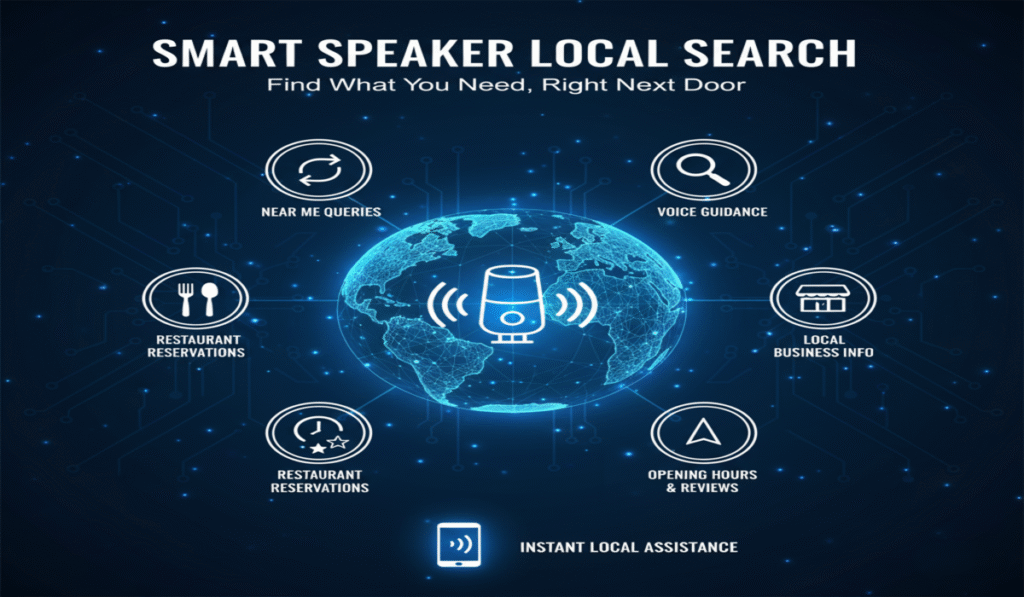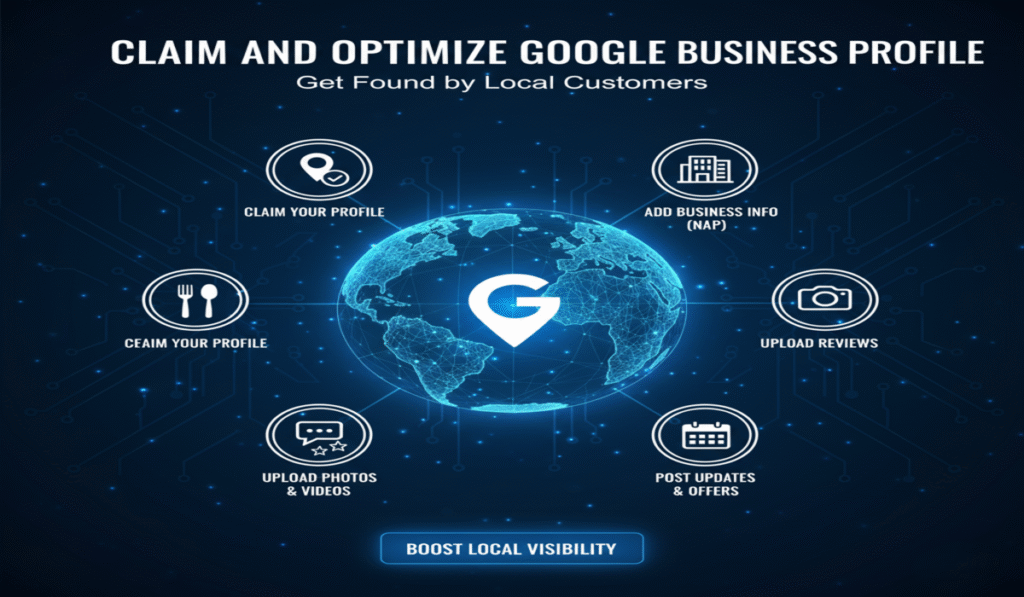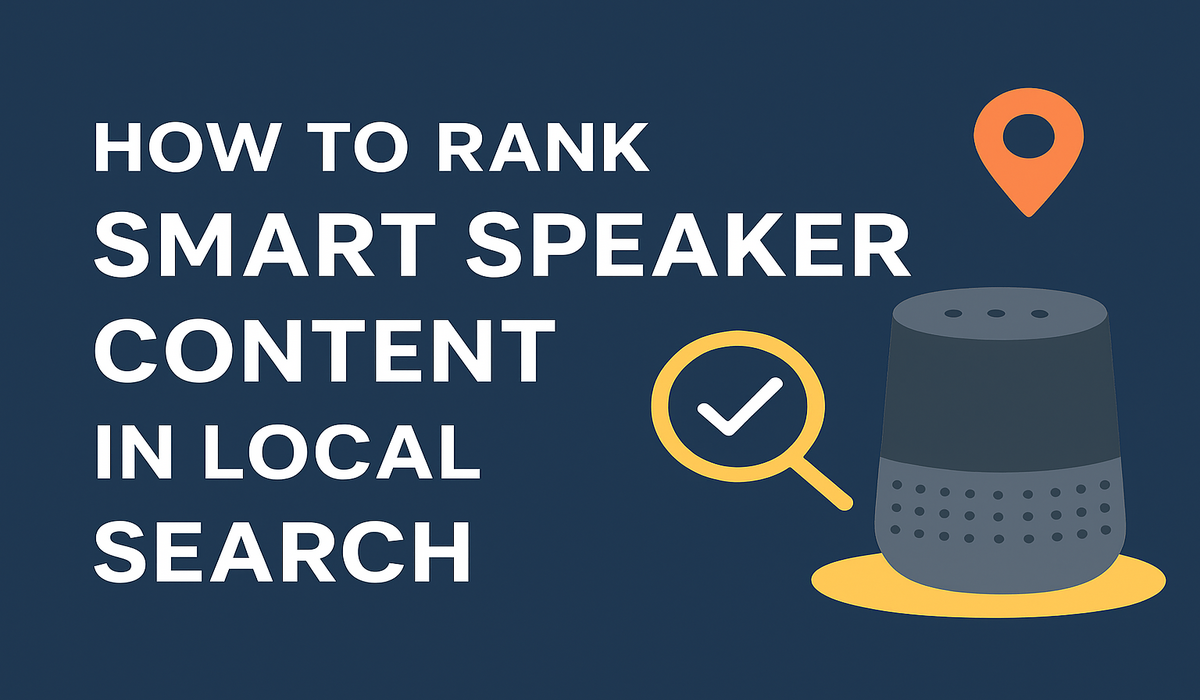Discover how to rank smart speaker content in local search with proven SEO strategies, voice optimization, and local visibility techniques that boost brand reach in the voice-first era.
Table of Contents
Introduction: How to Rank Smart Speaker Content in Local Search
Smart speakers like Amazon Echo, Google Nest, and Apple HomePod have end up an vital part of cutting-edge households. Millions of people now use voice assistants like Alexa, Google Assistant, and Siri to invite questions, keep online, and discover nearby corporations.

This shift has created a new undertaking for businesses: how to rank smart speaker content in local search. Unlike traditional search engines like google and yahoo, clever audio system deliver one answer at a time—and in case your brand isn’t selected, you pass over the opportunity completely.
That’s why optimizing your virtual presence for voice-pushed neighborhood queries is now not optionally available—it’s vital for survival within the age of conversational AI.
In this blog, we’ll explore how to rank smart speaker content in local search, techniques you could observe, errors to keep away from, and the destiny of voice-first search engine optimization.
Understanding Smart Speaker Local Search

Before getting to know how to rank smart speaker content in local search, it’s important to recognize how those gadgets work.
- Voice-activated queries: Users talk certainly, consisting of “Where’s the first-class espresso store near me?”
- AI-powered responses: Smart audio system pull statistics from search engines like google and yahoo, enterprise listings, and dependent content.
- Single-solution shipping: Unlike internet outcomes, only one enterprise or piece of content material is selected.
This makes local optimization vital because most voice queries are location-particular.
Why Ranking for Smart Speaker Local Search Is Different
Traditional search engine marketing and voice search engine optimization are not the same. Let’s destroy it down:
- Typed searches: Short and key-word-centered. Example: “espresso save Lucknow”
- Spoken searches: Conversational and long-tail. Example: “Which espresso store is open close to me proper now?”
Smart audio system use natural language processing (NLP), so brands need to optimize content material for conversational tone. To be triumphant, you need to assume like a patron speakme to a tool, now not typing right into a search bar.
Strategy 1: Optimize for Conversational Queries
The first step in gaining knowledge ofhow to rank smart speaker content in local search is developing content that matches how people clearly communicate.
Tips:
- Use lengthy-tail key phrases in a herbal way.
- Answer questions directly (use FAQs, how-to courses).
- Focus on who, what, while, where, and how questions.
Example: Instead of writing “first-class pizza Lucknow,” create content material like:
“Looking for the exceptional pizza in Lucknow? Our restaurant serves sparkling, wooden-fired pizzas equipped for shipping close to you.”
Strategy 2: Claim and Optimize Google Business Profile

Smart audio system depend closely on Google Business Profile (GBP) information for local answers. If you want to realize how to rank smart speaker content in local search,, your GBP profile need to be sturdy.
Checklist:
- Ensure NAP consistency (Name, Address, Phone wide variety).
- Add accurate business hours, services, and categories.
- Upload photos, menus, and updates often.
- Collect and respond to evaluations, on account that they have an impact on voice seek answers.
Strategy 3: Focus on Featured Snippets
Many clever speaker responses come from featured snippets on Google. If your content is structured to win snippets, you increase probabilities of being examine aloud by devices.
How to optimize:
- Use clear headings (H2, H3).
- Provide quick, direct answers in 40–50 words.
- Add lists, tables, and step-by-step instructions.
Example: For the question “How to trade a vehicle tire”, a step-by using-step list will increase probabilities of being decided on.
Strategy 4: Leverage Local Keywords
Smart speaker queries often encompass phrases like “close to me,” “closest,” or “open now.” If you’re extreme about how to rank smart speaker content in local search, you need to certainly consist of these phrases.
Example Phrases:
- “Best dentist near me”
- “Coffee keep open now”
- “Closest gas station with EV charging”
Optimize your landing pages, blogs, and GBP with those conversational neighborhood terms.
Strategy 5: Use Schema Markup for Voice Search
Structured records helps clever audio system understand and deliver your content more successfully.
Types of Schema to Use:
- LocalBusiness schema (commercial enterprise info)
- FAQ schema (commonly asked questions)
- Event schema (local events, promotions)
- Review schema (ratings, testimonials)
Adding schema markup increases your visibility in voice-driven seek outcomes.
Strategy 6: Improve Website Speed and Mobile Experience
Most voice searches come from mobile customers or clever devices related to the net. Google prioritizes fast, mobile-friendly web sites.
Tips:
- Use light-weight issues.
- Compress pix.
- Enable AMP pages for faster loading.
- Ensure your website online is cell-first.
Without velocity optimization, even top notch content gained’t assist you win clever speaker solutions.
Strategy 7: Build Trust with Reviews and Ratings
Smart speakers often recommend businesses with higher ratings and reviews.
How to boost reviews:
- Encourage happy customers to leave reviews.
- Respond politely to both positive and negative feedback.
- Showcase testimonials on your website.
Remember: Positive sentiment influences AI-driven local recommendations.
Common Mistakes to Avoid
When learning how to rank smart speaker content in local search, avoid these pitfalls:
- Keyword stuffing: Makes content unnatural and lowers ranking.
- Ignoring NAP consistency: Confuses AI assistants.
- Skipping schema markup: Missed opportunity for structured recognition.
- Not updating GBP: Outdated info leads to lost visibility.
Future of Smart Speaker Local Search
The destiny of local search engine optimization is voice-first. AI assistants will maintain evolving into personalized seek companions. Brands that adopt strategies now will revel in a aggressive gain.
In a few years, clients gained’t simply search—they’ll depend on AI to propose depended on neighborhood corporations. Knowing how to rank smart speaker content in local search. these days guarantees your brand stays relevant tomorrow.
Conclusion
Ranking for clever speaker local search isn’t pretty much keywords—it’s about verbal exchange, context, and credibility.
By optimizing for conversational queries, updating your Google Business Profile, leveraging schema markup, and inspiring reviews, you could successfully grasp how to rank smart speaker content in local search.
Businesses that adapt early to this shift will now not only benefit visibility but additionally earn consider as the selected voice of AI-driven suggestions.
FAQs : How to Rank Smart Speaker Content in Local Search
Q1: Why is voice search important for local businesses?
Voice seek is developing rapid, and maximum queries are nearby. Smart speakers frequently advise just one result, making visibility crucial.
Q2: How do smart speakers choose which business to recommend?
They pull records from Google Business Profile, opinions, nearby listings, and structured content with schema markup.
Q3: Can small businesses benefit from smart speaker SEO?
Yes. Local groups with optimized GBP, conversational content, and robust reviews can compete with big brands.
Q4: What role does schema markup play?
Schema facilitates clever speakers understand commercial enterprise details, FAQs, and reviews, increasing chances of being chosen.
Q5: How fast will voice search grow?
Studies endorse that by using 2026, over 55% of families can have at least one clever speaker, making optimization essential.


1 thought on “How to Rank Smart Speaker Content in Local Search”